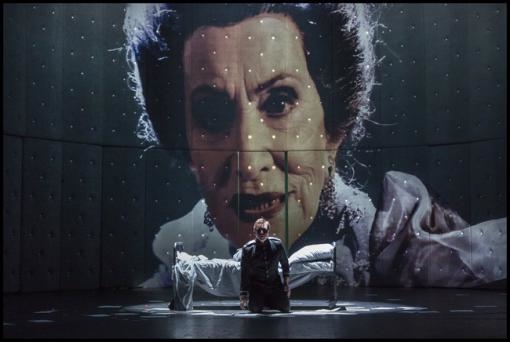After more than fifty years The Queen of Spades by Pyotr Ilyich Tchaikovsky is returning to the repertoire of the national Theatre Brno. The premiere on 17 February in the Mahen Theatre of the production by Martin Glaser also involves one more return for music theatre – after more than sixty years Soňa Červená will once more being treading the boards in Brno.
Perhaps even greater attention, and not just in the media, than the new production itself, resulted from the information that the role of the Countess, or one of her alter egos, will be played by the legendary Červená. Martin Glaser as director made of the role an acting triangle: on the stage there also appeared the Countess’ past (Veronika Hajnová-Fialoavá), the Countess’ present (Jitka Zerhauová) and the Countess’ future, who links Heřman with death (Soňa Červená). It is her who slips Heřman the revolver, for her to die, and gives it to him later so that he can also take his own life. And surprisingly this interpretation and the exhausting of a single part organically fitted into the telling of his story without any suspicion of self-indulgence.
Martin Glaser and Pavel Borák (sets) placed the production within the walls of a mental institution. High walls and padded mattresses circle the stage of the Mahen Theatre and for the performance they are only decorated by the projections and the glow of light bulbs. A simple and practical solution, just like the costumes by Markéta Sládečková. The creator of the costumes essentially kept to the classical style of the period, but of course without much in the way of decoration. Except perhaps for the intermezzo scenes that parody baroque theatre in overly flamboyant costumes and gestures, cardboard cherubs and kittens. A little out of place were the chorus’ costumes in the ballroom scene with their plethora of geometric shapes that casually referred to suits of cards.
The grey walls remind Heřman on his hospital bed of his surrender to a destructive desire for the unattainable. Playing the game with the three fateful cards brings a certain win. Although with his part his role was loud and dramatically exposed, Eduard Martynyuk did not give his character even a hint of exaggerated pathos. One would expect that from the start he would show his full strength, but Mertynyuk has at his disposal a broad voice of such great power and clear tonal colouring that he could afford to give a balanced expression of the maximum intensity of Russia's naturalism from beginning to end over a more than three-hour-long evening. As Heřman, in a state on the edge of madness, he was on stage almost throughout the production. And even in scenes where he was in the background he remained theatrically present and convincing, with an expression of lunacy, creeping along the walls, swaying on his bed, trembling hands constantly fiddling with the blanket. His love and also his means of getting the three cards, Lisa, was played by Natalya Romaniw. She dispelled the impression of a darkening voice in the first duet with Polina (Jana Hrochová), then excelled with the desired vocal brightness and gave the character tenderness, internal confusion and a deadly devastating sense of betrayal. Igor Loškár did wonderfully in the role of Prince Yeletzky at her side. He did not overdo his aria, giving it a great sense of resignation; in the ensemble scenes his pleasantly resonant voice governed the vocal colouring. On stage both in singing and also visually, Count Tomsky - Pavoľ Remenár excelled, his piercing baritone voice even breaking through the padded wings. Josef Škarka and Petr Levíček also put on a bravura performance – a comic duo of a couple of odd customers.
The Janáček Opera under Pavel Koňárek continues to set a high standard, with precise articulation, well thought out dynamics and clean harmonies. From the start the female chorus had to deal with an unfortunate absorbing half of their sound, but once it was positioned to the front of the stage however the sound carried, no longer being blocked. Particularly impressive was the acapella male chorus at the very end pleading for Heřman’s redemption. The musical production was the work of the conductor Robert Kružík. He kept the orchestra together at full strength without interruption, with deep emotionality and contrasts and without exception avoided drowning out the singers. His clear directions also kept the rhythm under control even in the difficult ensemble passages.
Perhaps also due to Glaser‘s functional metaphor, where in the triple role of the Countess in addition Jitka Zerhauová and Veronica Hajnová-Fialová also appeared, Soňa Červená was able to perform less than three weeks after leg surgery. Although she did not have many sung parts, she did not need them to express herself. This lady entered on stage and was dramatically the strongest entity there. The longed for return to the Brno stage of Soňa Červené, who even at such a venerable age has not been stopped by a demanding operation, deserves appreciative admiration. As does the director’s novelties and the interpretive refinement of this new opera production in Brno.
Composer: Pyotr Ilyich Tchaikovsky, libretto: Modest Ilyich Tchaikovsky from a story by Alexander Sergeyevich Pushkin, musical production, conductor: Robert Kružík, director: Martin Glaser, sets: Pavel Borák, costumes: Markéta Sládečková, lighting design: Martin Špetlík, movement cooperation: Martin Pacek, choirmaster: Pavel Koňárek, choirmistress for Brno Children’s Choir: Valerie Maťašová, video-projection: Martin Svobodník, Jan Fuksa, dramaturgy: Patricie Částková. Premiere 17 February

































No comment added yet..